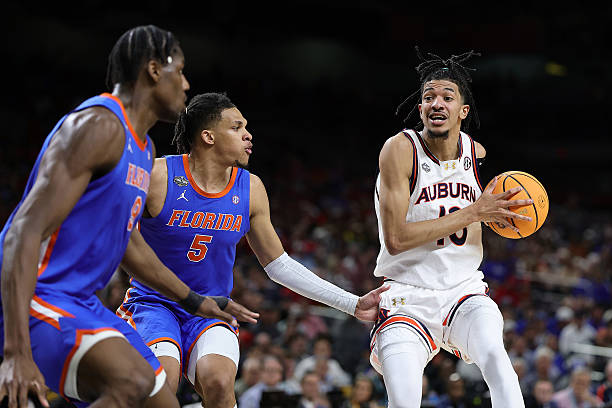In a stunning revelation that has sent ripples through the college basketball world, it has been reported that Chad Baker-Mazara, a talented guard, signed a contract with Auburn University before officially entering the NCAA transfer portal. The news has raised eyebrows across the sports community, as it suggests a behind-the-scenes maneuver that could have significant implications for the transfer process, player movement, and NCAA regulations.
The Unexpected Twist
Chad Baker-Mazara, who had been a key player for his previous team, is known for his scoring ability, athleticism, and versatility. His decision to enter the transfer portal was anticipated, but what came as a shock was the timing and the fact that, according to multiple reports, he had already signed a contract with Auburn prior to making the move. This information has sparked a wave of questions about the ethics of the situation and the broader dynamics of college basketball recruitment.
Typically, when a player enters the transfer portal, they become a free agent of sorts, able to explore options with various programs. However, Baker-Mazara’s alleged pre-portal contract with Auburn raises concerns about whether this was an attempt to circumvent the intended openness of the transfer process. College basketball has already been dealing with increased scrutiny around the role of NIL deals (Name, Image, and Likeness) and the accelerated pace of player transfers in recent years, making this situation all the more complicated.
The Role of the Transfer Portal
The NCAA transfer portal, introduced in 2018, was designed to give student-athletes more freedom and autonomy over their collegiate careers. Players entering the portal can communicate with programs of their choice, allowing them to find new opportunities for playing time, scholarship offers, or overall career advancement. The idea was to make the process more transparent and fair, removing some of the limitations athletes faced in terms of transferring schools.
However, with the rise of NIL deals and the growing commercial interests surrounding college athletes, questions have emerged regarding the integrity of the transfer portal system. Reports like the one involving Baker-Mazara, which suggest deals may be in place before a player officially enters the portal, only fuel concerns that the system might be open to manipulation. If contracts are being signed in advance of a player’s official move, it could undermine the intent of the portal and create unfair advantages for programs with deeper pockets or more sophisticated recruiting networks.
Auburn’s Strategic Advantage
If the reports are confirmed, Auburn University could be in a unique position, having secured a player like Baker-Mazara under potentially murky circumstances. For Auburn, a team with championship aspirations, securing a highly touted transfer in the midst of a competitive recruiting cycle could provide them with the added depth they need to contend for a national title. Baker-Mazara’s addition would bolster the Tigers’ backcourt and provide an immediate scoring threat.
The question now, however, is whether Auburn will face any backlash from the NCAA or if the university will be held accountable for the reported timing of the contract. As of now, Auburn has not commented publicly on the situation, and it remains to be seen whether this story will evolve into a broader controversy.
What This Means for the NCAA
The Chad Baker-Mazara situation is indicative of a larger issue facing the NCAA: the growing complexity of college sports amidst the evolving landscape of NIL rights, the transfer portal, and recruitment regulations. While players now have more freedom than ever, the framework in which they operate has struggled to keep up with the pace of change. This instance could potentially push the NCAA to reconsider its regulations or take a closer look at how transfer decisions are made, and how much influence external factors, like pre-portal agreements, have on the process.
In the coming weeks, this story is likely to be a focal point of conversation within the college basketball world. Whether it leads to changes in the transfer portal system or remains an isolated incident, it serves as a reminder of how quickly the dynamics of college sports are evolving, and how much is at stake for players, programs, and the future of NCAA athletics.
Ultimately, the Chad Baker-Mazara saga raises important questions about fairness, transparency, and the balance of power within college sports. While players have more agency than ever before, the rules that govern their movement and recruitment remain in flux. How this story unfolds could very well shape the future of the transfer portal and its role in collegiate athletics.
